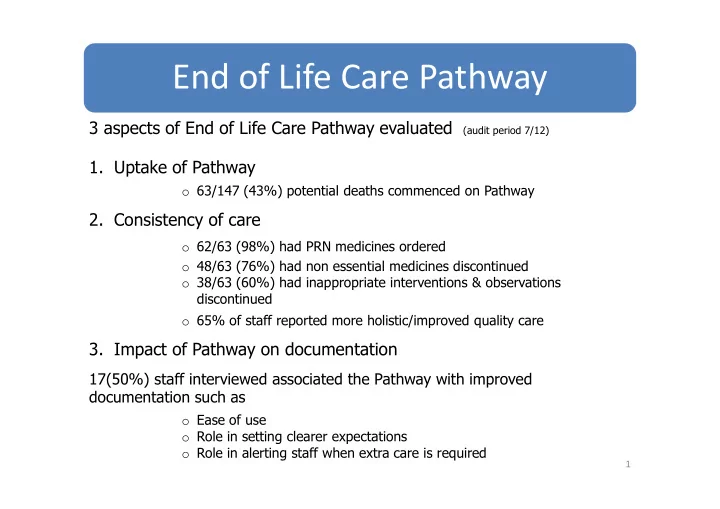

End of Life Care Pathway ������������������������������������������������� ������������������� �� ���!������������ o "���#���#�$���������������������%%������������������ �� �������������������� o "��"���&'$�������()�%����������������� o #'�"����"$��������������������%���������������������� o �'�"���"*$����������������������������������+��,����������� ������������� o "-$�������������������%��������������%�������.������������� ����/%�����������������������%��������� ���-*$�������������������������������������������������%������� ����%����������������� o ������������ o (�������������0����������1����������� o (��������������0�������������1��������������.������ 1
Medicine Management Transfer to hospital for symptom management 2
Systems to support practice Support for staff 13/14 (92.8%) RACFs reported post implementation that changes had occurred as a result of being involved in the project. Of these 9/13 (69%) RACF managers nominated issues directly related to 9/13 (69%) RACF managers nominated issues directly related to staff. o 5/9(55%) identified additional training e.g. PEPA o 4/9 (44%) identified increased staff awareness 9/14 (64%) RACFs established a palliative care committee or equivalent 3
Systems to support practice Information for residents & relatives: Baseline Post-education Family meetings and case conferencing 10 RACFs 14 RACFs procedures established. 71% 100% Residents and families always provided with 0 RACFs 7 RACFs written information about end-of-life care when 0% 50% terminal phase identified. Families involved in decisions about residents 11 RACFs 13 RACFs end-of-life care. 79% 93% 4
Education • 392/794 (49%) RACF staff participated • 20/34(58%) cited improvement in staff knowledge skills and medicines knowledge • 22/34(65%) cited improved confidence in approaching end of 22/34(65%) cited improved confidence in approaching end of life care “ the education helped tremendously, particularly (as) a PCA worker, we’re able to monitor…….and know what we are looking for. These are not always things that we get trained in …….so (it’s) quite enlightening” (PCA) “I just used to feel I had to be there to make sure that everything’s done. Now…even of I’m not here, someone has the knowledge to actually put something in place, to make sure that the care is attentive” (Manager RACF) 5 •
Education 38/176 GPs participated in education (=22% of all GPs care for 47% of the residents in the • project) 23/23 (100%) GPs post Module 1 and 26/26 (100%) GPs post Module 2 agreed or completely • agreed the education had influenced their considerations when prescribing 23/23 (100%) GPs post Module 1 agreed or completely agreed that their confidence had • increased in prescribing analgesics at end of life increased in prescribing analgesics at end of life 26/26 (100%) GPs post Module 2 agreed or completely agreed that their confidence had • increased in prescribing medications for managing agitation, dyspnoea, secretions and mouth discomfort at the end of life 18/23 (78%) GPs reported intention to change practice (post evaluation module 1) • 23/26 88% reported intention to change practice (post evaluation module 2) • 6
Clinical Support Evidence of collaboration Baseline Post- education Processes to ensure General Practitioners and locums 8 RACFs 11 RACFs informed about residents’ end-of-life goals of care. informed about residents’ end-of-life goals of care. (57%) (57%) (79%) (79%) Communication process to contact General 9 RACFs 12 RACFs Practitioners about end-of-life issues. (64%) (86%) Residents’ goals of care accessible to GPs and locum 5 RACFs 13 RACFs service. (36%) (93%) Staff communicates with residents’ General 9 RACFs 13 RACFs Practitioners about end-of-life care. (64%) (93%) Staff document communication with residents’ General 7 RACFs 13 RACFs Practitioners about end-of-life care. (50%) (93%) 7
Clinical Supports “ Collaboration has improved with GPs because we actually get them in and we have the family meeting now with the GP… they're happy knowing that the tool's there and look at it as well” (M anager RACF). “We’re talking about it at all levels, medico to medico, medico to nursing staff, nursing staff amongst themselves and family and relatives… we can allow people to die well”. (GP). 8
Preparation for the end of life This was evaluated across three areas • staff awareness • information given to residents and families • recording of residents’ end of life preferences recording of residents’ end of life preferences and the appointment of substitute decision- makers 9
Preparation for the end of life 2���������,��������������� 4������� ����5 �������������������������� ������������ ���$� ��1����������!�3 ���$� 6�� �-����'��� �*������&� )� �-���"��� &&���#�*� ����� ����#�&� �������� 10
Preparation for end of life “ Staff are recognising (that a person is dying) earlier …talking to the doctors earlier and then making sensible decisions about putting something else in place sensible decisions about putting something else in place a lot sooner”(RN) 11
Preparation for end of life Information to residents and families • 60/63 (95%) residents on a Pathway had documented evidence of discussion with family/resident representative • 12/63 (19%) families received palliative care literature during the audit period (Nov–July) the audit period (Nov–July) However, by October 2010 post implementation: • 7/14 (50%) RACFs stated that they always provide written information to residents and families when terminal phase is identified, up from 0 (0%) at baseline. 12
Preparation for end of life Are preferences for end of life Baseline Post-intervention care documented? n (%) n (%) Yes 286 (64.1) 281 (69.2) No 157 (35.2) 123 (30.3) Unsure 3(0.7) 2 (0.5) Substitute decision-maker appointed? Yes 341 (76.8) 370 (90.2) No 90 (20.3) 26 (6.3) Unsure 13 (2.9) 14(3.4) 13
• National program to support the implementation of an End of Life Pathway into all RACF • National program to support provision of • National program to support provision of education in end of life care specific to RACF • Imprest Medications Systems should not be cost prohibitive in Victoria 14
Resources available: • Brisbane South Palliative Care Collaborative. Residential Aged Care End-of-Life Care Pathway (RAC EoLCP) 2011. http://www.health.qld.gov.au/cpcre/eol_pthwys.asp • Palliative Care Victoria www.pallcarevic.asn.au/ Palliative Care Australia www.palliativecare.org.au/ • • CareSearch www.caresearch.com.au/ • CareSearch www.caresearch.com.au/ • WA Cancer & Palliative Care Network. Palliative care resources. http://www.healthnetworks.health.wa.gov.au/cancer/palliative/resources.cfm • National Palliative Care Program. Program of Experience in Palliative Approach (PEPA) http://www.pepaeducation.com/ 15
Diana Cooper 03 9496 4333 diana@nevdgp.org.au Clare Chiminello 03 9496 4333 Clare Chiminello 03 9496 4333 clare@nevdgp.org.au 16
17
Recommend
More recommend